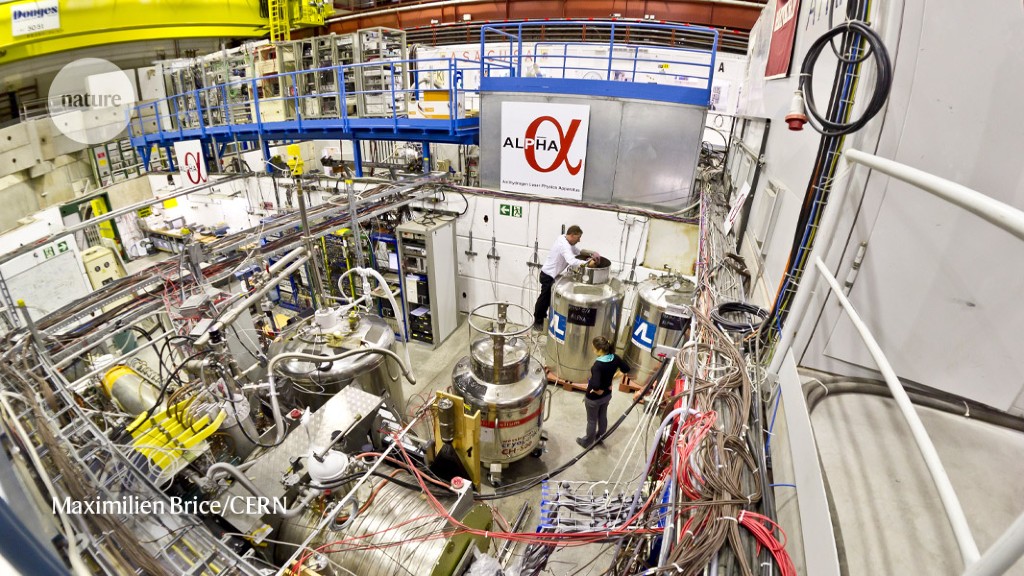Since the discovery of antimatter decades ago, particle physicists have wondered if these particles were repulsed by gravity. Einstein predicted that despite having opposite charges to its regular matter counterparts, antimatter should still behave like matter does concerning gravity. This has been tricky to confirm experimentally since it’s hard to make enough antimatter to observe its behavior. Particle physicists have finally pulled it off, using the ALPHA-g experiment at CERN, generating antihydrogen atoms and then dropping them in a 3-meter tall vertical shaft.
[description taken from Fraser Cain’s mastodon post ]
Fucking love these looney tunes physics headlines
I wouldn’t have thought it would, since from my recollection antimatter is distinguished by having the same mass but opposite electrical charge, which shouldn’t affect how it responds to gravity. But it’s always good to have confirmation.
It shouldn’t, based on our theories, but we know something is “off” with gravity. QM and GR fundamentally disagree on its nature. This is one of those baseline experiments to confirm what we are assuming is true actually holds. It’s also an absolute bitch of an effect to detect and measure.
Yes because antimatter and negative matter are different things, although I’m unsure if anti-negative matter is expected to exist or not.
So I’m kind of confused about this experiment because I thought this was already known.
Removed by mod
Let’s face it, the real motivation behind this experiment was “I really want to make some antimatter booms!”.
I’ve known physicists IRL. Only bunch crazier are biologists.
Also, few groups that I’ve encountered have had as high of a percentage of kinksters than chemists.
It’s all the fumes they’re constantly inhaling.
Do bartenders count?
Maybe if they’re wearing a labcoat.
Biologists get laid more though
Are there any known particles that are repelled by mass, or would ‘fall up’?
There are no known particles. However, you can get a great foray into negative inertial mass from a PBS Spacetime that was done on the subject.
The answer is, we don’t know, but it seems unlikely as negative inertial mass breaks a lot of well established things. But you never know, could be something we’re missing that “fixes” all the breakage negative inertial mass causes.
Nope.
We’re one step closer to clean burning anti-matter bombs like from DaVinci Code
If the explosion is as pretty as in the movie, thwn I’m all for it.
Darn, was hoping I could tape some to the bottom of my shoes and walk into space
Tape some onto the bottom of your shoes and you’re blasted into space so maybe there’s something in that idea
You don’t want antimatter, you want flubber.
What you are looking for is Cavorite
i used to get confused by physics headlines like these: how come such seemingly fundamental facts aren’t/weren’t known when there are so many really smart and dedicated people studying physics?
but after taking a differential geometry class, i get it now. that stuff is hard. and differential geometry is just the foundation for what these people are studying. there are some very cursed and counterintuitive things going on behind the scenes.
how come such seemingly fundamental facts aren’t/weren’t known when there are so many really smart and dedicated people studying physics?
Common sense and theories told us antimatter falls down. But it’s hard to actually run the experiment. That’s the new part.
I’m looking forward to a breakthrough in our lifetimes. Maybe something which makes fusion cost effective and viable. Imagine the world with cheap, clean, and unlimited energy. I would really like to see something with regards to controlling gravity. All of a sudden terrestrial and space flight is cheap and reliable and ubiquitous. My holy grail is warp technology. I’ve always dreamed of exploring the stars, but the theoretical physical speed limit makes this impractical. Imagine if we could start exploring the galaxy. Given the lack of perceived intelligence in the universe, I suspect there’s no getting around that one. Our simulation’s rules cannot be broken.
I mean kinda obvious, it still has positive mass…









